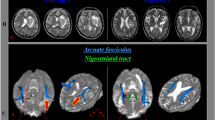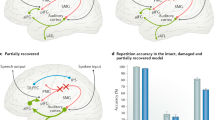Abstract
Although it has been established that the left cerebral hemisphere subserves spoken language, the nature of brain organization for sign language remains relatively unexplored.The issue is especially important because sign language displays the complex linguistic structure of spoken languages,but conveys it through manipulation of visuo–spatial relations1, thereby exhibiting properties for which the hemispheres of hearing individuals show opposing specializations. We had the unique opportunity to study a hearing signer proficient in American sign language (ASL), during the left intra-carotid injection of a barbiturate (the Wada test), and before and after a right temporal lobectomy.The subject was a strong right-hander. Neuropsychological and anatomical asymmetries suggested left cerebral dominance for auditory-based language.Emission tomography revealed lateralized activity of left Broca's and Wernicke's regions for spoken language.The Wada test,during which all left language areas were rendered inoperative,caused a marked aphasia in both English and ASL. After partial ablation of the right temporal lobe, the abilities to sign and understand signing were unchanged.These data add further support to the notion that anatomical structures of the left cerebral hemisphere subserve language in a visuo-spatial as well as an auditory mode.
This is a preview of subscription content, access via your institution
Access options
Subscribe to this journal
Receive 51 print issues and online access
$199.00 per year
only $3.90 per issue
Buy this article
- Purchase on Springer Link
- Instant access to full article PDF
Prices may be subject to local taxes which are calculated during checkout
Similar content being viewed by others
References
Klima, E. S. & Bellugi, U. The Signs of Language (Harvard University Press, 1979).
Bellugi, U. Signed and Spoken Language: Biological Constraints on Linguistic Form, 115–140 (Verlag Chemie, Weinheim, 1980).
Poizner, H. & Battison, R. in Recent Perspectives on American Sign Language (eds Lane, H. & Grosjean, F.) 79–101 (Erlbaum Associates, Hilsdale, 1980).
Rezai, K. et al. Neurology 34(3), 204 (1984).
Knopman, D. S., Rubens, A. B., Klassen, A. C. & Meyer, M. W. Arch. Neurol. 39, 487–493 (1982).
Goodglass, H. & Kaplan, E. The Assessment of Aphasia and Related Disorders (Lea & Febiger, Philadelphia, 1983).
Wada, J. & Rasmussen, T. J. Neurosurg. 17, 266–282 (1960).
Damasio, H. Arch. Neurol. 40, 138–142 (1983).
Hoeman, W., Criswell, E., Wada, A. & Ross, D. Neurology 32, 1020–1023 (1982).
Bellugi, U., Poizner, H. & Klima, E. A. Hum. Neurobiol. 2, 155–170 (1983).
Poizner, H., Kaplan, E., Bellugi, U. & Padden, C. Brain Cognition 3, 281–306 (1984).
Bellugi, U., Poizner, H. & Klima, E. S. What the Hands Reveal About the Brain (Braford Books, Cambridge, Massachusetts, in the press).
Author information
Authors and Affiliations
Rights and permissions
About this article
Cite this article
Damasio, A., Bellugi, U., Damasio, H. et al. Sign language aphasia during left-hemisphere Amytal injection. Nature 322, 363–365 (1986). https://doi.org/10.1038/322363a0
Received:
Accepted:
Issue Date:
DOI: https://doi.org/10.1038/322363a0
This article is cited by
Comments
By submitting a comment you agree to abide by our Terms and Community Guidelines. If you find something abusive or that does not comply with our terms or guidelines please flag it as inappropriate.



